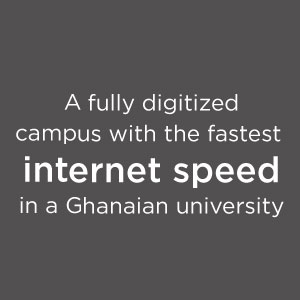

BSc Computer Engineering
Grooming Tomorrow's Computer Gurus
A simple abacus may have inspired its invention, but after gaining its greatness in the last two decades of the 20th century, computers have taken the lead in technological developments across the globe in recent years.
With the ever-evolving area of complex computer systems, hardware and software, the need to groom young talents for technological advancement have become necessary for the rapid growth of industry.
These young creative minds, known professionally as Computer Engineers, will occupy the key role as software developers and hardware engineers among other roles in many industries.
BSc Computer Engineering at ACity
In ACity, our Bachelor of Science in Computer Engineering program is designed to provide those passionate about computing, computer hardware and peripheral design as well as software engineering with the requisite tools and skills needed for further advancement in digital technology, computer networking, and computer systems. The depth of our program ensures that students at graduation are at par with contemporaries from similarly placed institutions.
Finally, this curriculum delineates pathways for students hoping to pursue advanced studies in Computer Engineering by ensuring that specific electives allow them to focus on specific areas of concentration
January 2026 Intake Is Open

Apply Now
Start your journey towards higher education by submitting your online application today! Click the 'Apply Now' button below and fill out the required information. Apply now and take the first step towards realizing your academic goals.
Top Careers In Computer Engineering

The US Bureau of Labor Statistics projects a 5% growth for computer engineering jobs through 2026. This statistic represents significant opportunities for computer engineering students as they prepare for the world of work. What jobs await you in the future? Check out some top options
| Computer Hardware Engineer | Computer Network Architect |
| Computer Systems Analyst | Cyber Security Analyst |
| Software Developer | Big Data Engineer |
Entry Requirements
Minimum C6 in 6 subjects including 3 core subjects (English, Mathematics, Integrated/General Science) and 3 elective subjects. (Physics, Elective Mathematics + Chemistry OR any other elective relevant to the chosen Program)
Minimum D or a pass in 6 subjects including 3 core subjects (English, Mathematics, Integrated/General Science) and 3 elective subjects. (Physics, Elective Mathematics + Chemistry OR any other elective relevant to the chosen Program)
Minimum of 5 credit passes in the IGCSE/O-Levels (Mathematics and English mandatory) and 3 passes in the A-Levels. (Elective/Add/Further Mathematics and Physics mandatory).
Minimum of 5 credit passes in the IGCSE/O-Levels (Mathematics and English mandatory) and a minimum score of 4 points in 3 Higher Level (HL) subjects. (Elective/Add/Further Mathematics and Physics mandatory)
Minimum of 50% overall average pass. (subject to approval NAB) Mathematics, English and Physics mandatory
Minimum GPA of 3.0 (Mathematics, English and Physics mandatory)

Want To Know
More Information
Get the course pdf or offline application form below
Course Outline
Communication Skills
French Language
Fundamentals of Innovation and Entrepreneurship (FIE) Seminar I
Introduction to Engineering
Introduction to Programming with Python
Physical Sciences
Pre-Calculus (with MATLAB)
Technology and Society
Analytic Geometry and Calculus I (with MATLAB)
Basic Electronics
Fundamentals of Innovation and Entrepreneurship (FIE) Seminar II
Introduction to Multidisciplinary Design
Logic and Critical Thinking
Programming in C
Sensors, Measurements and Instrumentation
Text and Meaning
Analytic Geometry and Calculus II (with MATLAB)
Circuit Theory
Computer Systems Engineering
Data Structures and Algorithms
Fundamentals of Innovation and Entrepreneurship (FIE) I
Fundamentals of Logic Design
Introduction to Material Science and Engineering
Leadership Seminar I
African Studies
Applied Linear Algebra (with MATLAB)
Computer Architecture and Organization
Digital Systems Design
Fundamentals of Innovation and Entrepreneurship (FIE) II
Microelectronics
Probability, Statistics and Reliability (with MATLAB)
Computer Networks
Differential Equations(with MATLAB)
Discrete Mathematics (with MATLAB)
Leadership Seminar II
Microprocessors and Microcontrollers
Signals and Systems
Operating Systems
System Dynamics
Automatic Control Systems
Digital Signal Processing
Embedded Systems
Industry Internship
Mechatronics
Software Engineering
Project Management, Engineering Economics and Risk Analysis
Computer Security
Introduction to Artificial Intelligence
Project Phase I
Technical Elective – I
Technical Elective – II
Environmental Science and Engineering
Professional Ethics and Values
Project Phase II
Technical Elective – III
Technical Elective – IV
Electives
Biomedical Instrumentation
Biomedical Signal Analysis
Real-Time Digital Signal Processing
Wireless Sensor Networks
Advanced Digital Signal Processing
High Speed Networks
Remote Sensing
Telecommunication Systems
Modelling and Simulation
Advanced Control Systems
Digital Image Processing
Machine Learning
Modeling and Analysis of Mechatronic Systems
Advanced Control Systems
Industrial Automation and Robotics
Machine Learning
Modeling and Analysis of Mechatronic Systems
Smart Grid
Solid State Electronic Devices
Energy Management for a Sustainable Future
Green Electronics
January 2026 Intake Is Open
Our Unique Learning Pillars
-

Experiential Learning
Hands-on learning to prepare students to readily apply concepts, to easily integrate into the workspace.
-

Contextual Learning
Solving real grass-root problems to expose students to the local context and develop empathy towards the continent’s progress.
-

Unified Learning
A project-based approach that combines concepts across courses to connect the dots and enable unified learning.
-

Extensional Learning
Arms students with a viable toolkit to help them confront real-life issues, they may not have encountered during their academic life, squarely.











